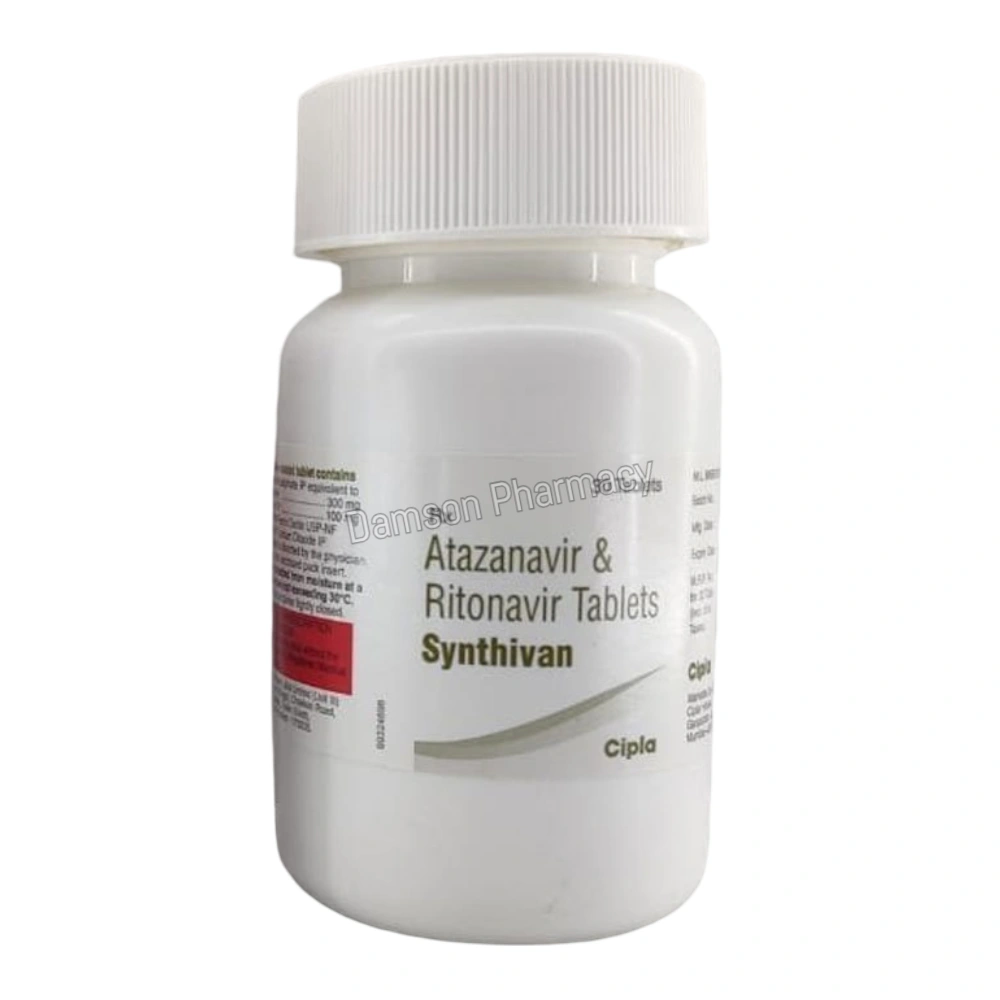Synthivan is used to treat HIV infection. It contains Atazanavir and Ritonavir, which work together to inhibit HIV protease and reduce viral load, helping control the infection.
Synthivan Atazanavir and Ritonavir Tablets
$120.00 – $342.00Price range: $120.00 through $342.00
| Pack Size | Price | Price / Unit | Quantity | |
|---|---|---|---|---|
| 30 Tablets | $120.00 | $4.00/ unit | ||
| 60 Tablets | $234.00 | $3.90/ unit | ||
| 90 Tablets | $342.00 | $3.80/ unit |
Looking for bulk / B2B pricing? | Send Inquiry |

| SKU | 11260 |
| Manufacturer | Cipla Limited |
| Categories | HIV & Herpes |
| Delivery Time | 10 - 14 Working Days |
| Strength | 300mg + 100mg |
Introduction to Synthivan Tablets
Synthivan Tablet is a prescription antiviral medication used in the treatment of HIV (Human Immunodeficiency Virus) infection. It is a combination of two active ingredients: Atazanavir and Ritonavir, both of which belong to a class of drugs known as protease inhibitors.
These medications help to control HIV infection, thereby improving immune function and reducing the risk of HIV-related complications. Atazanavir works by inhibiting the protease enzyme, which is essential for the HIV virus to multiply and infect more cells.
Ritonavir, in addition to its antiviral action, acts as a pharmacokinetic enhancer—it boosts the effectiveness of Atazanavir by slowing its breakdown in the body, ensuring longer and more consistent therapeutic levels in the bloodstream.
Uses of Synthivan Tablets
Here are some primary uses of Synthivan Tablets:
- Treatment of HIV-1 Infection
- Boosting Atazanavir Levels
- Prevention of HIV-related Complications
How Does Synthivan Works?
Synthivan Tablet works by combining two protease inhibitors: Atazanavir and Ritonavir. Atazanavir blocks the HIV protease enzyme, which is essential for the virus to replicate and produce new infectious viral particles. By inhibiting this enzyme, Atazanavir prevents the virus from maturing and spreading, thereby lowering the viral load in the body.
Ritonavir acts primarily as a booster rather than a main antiviral. It inhibits enzymes in the liver that would normally break down Atazanavir, allowing higher and longer-lasting levels of Atazanavir in the bloodstream. This enhances its effectiveness and reduces the need for higher dosages, improving overall treatment outcomes in patients with HIV.
Side Effects of Synthivan Tablets
- Nausea
- Diarrhea
- Headache
- Fatigue
- Insomnia
- Abdominal Pain
- Rash
- Changes in Appetite
- Elevated Liver Enzymes
Dosage of Synthivan Tablets
- The dosage of Atazanavir can vary depending on the specific formulation, the combination with other drugs, the patient’s age, weight, kidney function, and the severity of the HIV infection. Dosage should always be determined and prescribed by a qualified healthcare professional.
- Atazanavir is usually taken once daily, with or without food. If it is combined with other antiretroviral medications, the dosing schedule and instructions may differ. Always follow the healthcare provider’s recommendations regarding when and how to take the medication.
- Atazanavir should not be taken with food that is high in fat as it can reduce the absorption of the drug. In some cases, it may be co-administered with a small amount of low-fat food or a buffered antacid to enhance absorption.
- It is crucial to adhere to the prescribed dosage and not miss any doses. Consistent and regular intake of antiretroviral medications is essential for the effectiveness of HIV treatment.
- Dosage adjustments may be necessary if there are drug interactions with other medications the patient is taking or if there are underlying health conditions that may affect the metabolism or clearance of Atazanavir from the body.
How to Manage Side Effects?
- Communicate with Healthcare Provider
- Adhere to Dosage and Schedule
- Do Not Discontinue Abruptly
- Stay Hydrated
- Take with Food
- Use Sunscreen
- Monitor Liver Function
- Avoid Alcohol and Certain Drugs
Warnings & Precautions
1. Use only under medical supervision:
- Synthivan must be prescribed and monitored by a healthcare professional experienced in HIV treatment.
2. Not a cure for HIV/AIDS;
- It controls the virus but does not eliminate it; safe practices must still be followed.
3. Liver disease caution:
- Use with care in patients with liver impairment or hepatitis B/C, as it may worsen liver conditions.
4. Avoid with certain medications:
- Drugs like rifampin, midazolam, and simvastatin may interact dangerously with Synthivan.
5. Heart rhythm issues:
- May cause PR interval prolongation; caution in patients with heart disease or those taking other heart medications.
6. Diabetes and lipid monitoring:
- May increase blood sugar and cholesterol; regular lab tests are recommended.
7. Kidney stones or gallstones risk:
- Atazanavir can cause nephrolithiasis or cholelithiasis; hydrate well and report abdominal pain.
8. Pregnancy and breastfeeding:
- Use only if clearly needed during pregnancy; not recommended while breastfeeding due to risk of HIV transmission.
Storage
- Store at room temperature
- Keep away from direct sunlight
- Do not refrigerate or freeze
- Store in original packaging
- Keep out of reach of children
- Avoid storing in bathrooms
- Check expiry date regularly
Frequently Asked Questions
1. What should I do if I miss a dose of Synthivan?
If you miss a dose of Synthivan, take it as soon as you remember. If it is almost time for your next dose, skip the missed dose and continue with your regular dosing schedule. Do not take double doses to make up for a missed dose.
2. Where can I get more information about Synthivan?
For more information about Synthivan, including specific dosing guidelines, potential side effects, and interactions, consult your healthcare provider or pharmacist. They can provide personalized advice based on your medical history and individual needs.
3. What are the common uses of Atazanavir?
Atazanavir is primarily used as part of combination therapy for the treatment of HIV-1 infection in adults and children above a certain age and weight. It is usually prescribed in combination with other antiretroviral drugs to achieve better treatment outcomes.
4. How should I take Atazanavir tablets?
The specific dosing instructions for Atazanavir can vary based on factors such as the patient’s age, weight, other medications being taken, and the individual’s response to treatment. It is essential to follow the dosing instructions provided by your healthcare provider or as indicated in the product information. Atazanavir is usually taken with food to enhance absorption.
| Pack Size | 30 Tablets, 60 Tablets, 90 Tablets |
|---|---|
| Price/Unit | $3.80/unit, $3.90/unit, $4/unit |
Be the first to review “Synthivan Atazanavir and Ritonavir Tablets” Cancel reply
Related Products
HIV & Herpes
$240.00 – $630.00Price range: $240.00 through $630.00
This product has multiple variants. The options may be chosen on the product page












Reviews
There are no reviews yet.